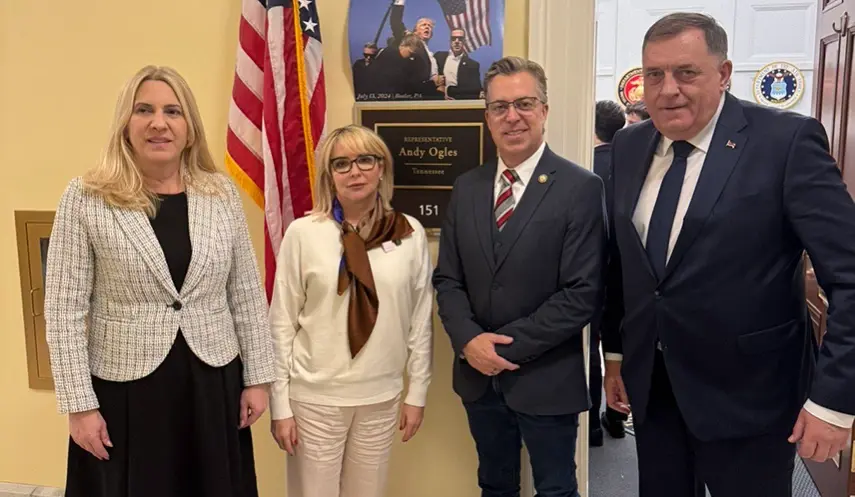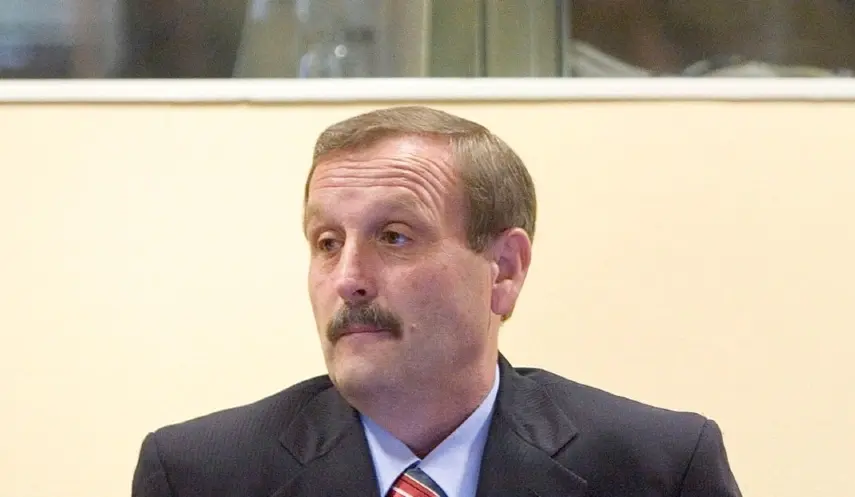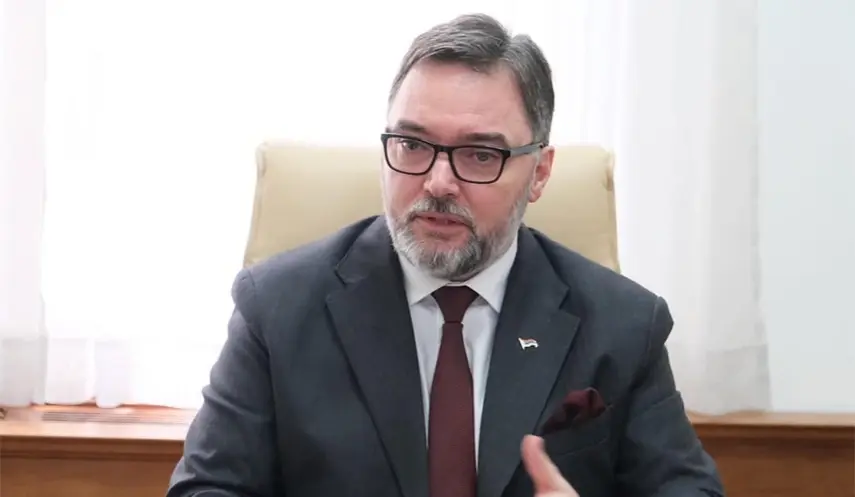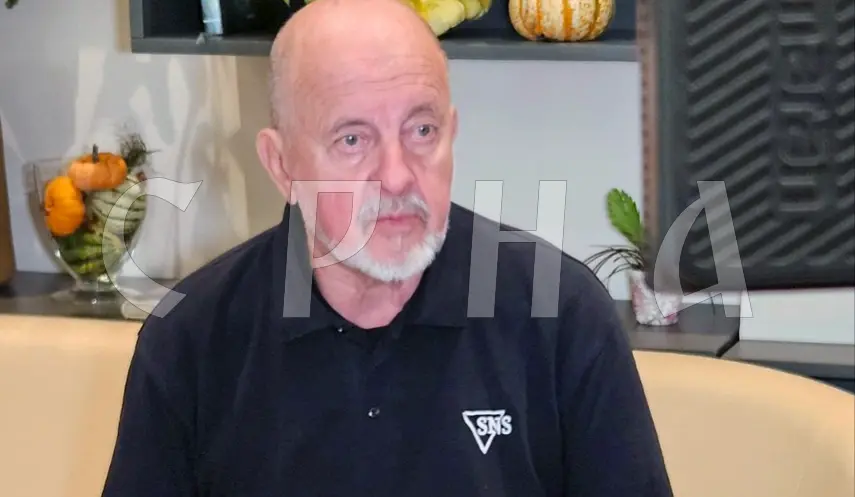CHARRED BODIES OF JNA MEMBERS ON THE ASPHALT; A "HEROIC DEED" FOR MUSLIM CRIMINALS
FBiH - Sarajevo - Dobrovoljačka Street /5/
05/28/2025
10:08

EAST SARAJEVO, MAY 29 /SRNA/ - The dramatic nature of the situation in which the members of the 65th Motorized Protection Regiment found themselves is also evident from the statement of Dušan Avramović, who at the time was the crime suppression officer in the 65th Motorized Protection Regiment.
Avramović stated that on May 2, 1992, he was at the Sarajevo Military District Command. Around eight o'clock, he was given the task of going with an armored personnel carrier from the Army Command to Grbavica, where there was a wounded man, and with him in the carrier were Senior Sergeant Ćurulija and four other soldiers.
His testimony, which is contained in the "Atlas of War Crimes against Serbs" published by the Republic Center for the Research of War, War Crimes and the Search for Missing Persons, is published in its entirety by our portal:
"We faced problems with getting the wounded out because they were shooting at us with a sniper from the Parliament building, but, nevertheless, we put the wounded man in a transporter and brought him to the Military Hospital.
In the meantime, it was announced over the radio that our transporter was not allowed to pass because we were transporting `Chetnik snipers` to the Military Hospital in it. I found out this when we arrived at the Military Hospital, and afterwards Colonel Toma Taušan, the director of the Military Hospital, denied this news on Radio Sarajevo.
TRAP FOR MEMBERS OF JNA, DIRECTED BY BiH MIA
In the meantime, it became necessary to bring four more wounded from the right side of the Miljacka, in Wilson's Promenade near the museum building. We could not access it, because the members of the `Green Berets` already had forces deployed on the right side of Miljacka.
Captain Labudović therefore asked for a police vehicle to follow us. The police vehicle went ahead with its rotating headlights and four flashing lights on, and we went behind it with the transporter. There we experienced an unpleasant situation, in that the police vehicle took us into the garage of the BiH Parliament, which was completely `covered` by the forces of the BiH Ministry of Internal Affairs /MIA/.
I realized that it was a trap and ordered one policeman to get out of the vehicle and put him in a transporter, and the other who remained in the MIA vehicle to head back towards the Military Hospital. That's how we were returned to the Military Hospital, and then from there we headed towards the Army Command, having previously informed Colonel Šuput what had happened and he sent us two transporters and two `PUHs` to help, so we safely reached the Army Headquarters.
Containers had already been placed on the road near the Skenderija Bridge, blocking traffic, so we had difficulty passing that barricade, or rather, we had to remove it in order to pass at all.
Upon the arrival to the Army Command Headquarters, about 11:15 a.m., we were informed that an attack has been launched on the Home of JNA in Sarajevo, and general Kukanjac ordered colonel Šuput to take his unit to the Home of JNA, to take the wounded to the hospital and to see what was going on.
By the way, it was reported that Lieutenant Colonel Bogoje Božinovski, the head of the JNA Home, was wounded, as well as a captain whose name I do not know. Three "PUHs" and three transporters went into action, and I was in the first "PUH" vehicle together with Colonel Šuput.
We were moving along Dobrovoljačka Street towards the Drvenija Bridge, and we intended to cross the Miljacka River at Tome Masarika Street and then turn right past the Jedinstvo Military Institution and reach the House of JNA. However, what caught our eye was the unusual silence and lack of people on the street. There was no one anywhere.
Both Šuput and I were very suspicious of this, so he ordered me to return to the Army Command Headquarters to maintain contact, and he transferred to the transporter with Captain Petrović. I returned to the Army Command Headquarters and maintained contact with Šuput via walkie-talkie.
HEAVY SHOOTING IN SARAJEVO BY MEMBERS OF THE "GREEN BERETS" AND MILITIA
As soon as I arrived at the Command Headquarters, heavy shooting began from the direction of the city. After a heavy explosion, several people from this column, which was heading towards the JNA House, reported to me. Thus, Sergeant 1st Class Radenko Magazin reported to me that he was seriously wounded and that two of his soldiers had been killed.
Captain Miodrag Marković reported that Sergeant Bojan Jovanović and two other soldiers were wounded on the street. Later, I heard Sergeant Magazin calling Colonel Šuput and reporting that he was seriously wounded in the legs and could not move.
I heard Colonel Šuput commanding, or rather, saying to try to break through to the building of the Đuro Đaković Workers' University, and as far as I understood from the conversation, Sergeant Magazin was right in his immediate vicinity.
While all this was happening, an attack began on the Command Headquarters of the 2nd Military District of the JNA. First, fire was opened on a food truck carrying soldier Goran Divović Divac. The commander of the vehicle was Lieutenant Goran Belić, the duty officer of the Army Command.
Fire was opened on this vehicle near the Drvenija bridge. This vehicle was accompanied by a 'PUH' in which the vehicle commander, Senior Sergeant Rade Nenadić, was. This vehicle managed to reach the stairs at the entrance to the Army Command, and the 'PUH' vehicle made a circle and entered the Command yard.
After this, Lieutenant Belić got out of the vehicle and entered the main entrance to the Command. It was visible that he was wounded in the right hand and said that the driver Divović had been shot in the back and was seriously wounded.
I went with Senior Sergeant Nenadić and two soldiers and we took Divović out of the vehicle and brought him inside the building. And during this time while we were bringing him in, fire was being opened on the Command. When we brought him in, he was placed in an ambulance and Dr Budimir Radulović, a colonel, came immediately and tried to help him.
However, at one point, Dr Radulović stood up and said that he could no longer help him because he was wounded in the spine, and then he started crying. The soldier was already unconscious at that moment. In the meantime, Colonel Šuput, who was blocked in the Đuro Đaković building, called me on the Motorola and told me that he had no connection with Kukanjac and that I should go to him and enable him to connect with him via the Motorola.
At that moment, Kukanjac sent a courier to get me, I went to him and established contact with Šuput via my Motorola. Šuput asked Kukanjac for help. He told him that a tank battalion had set off from Lukavica, that the air force would arrive and to hold on.
After about half an hour, Captain Labudović called and said that he had been attacked at Skenderija. He told me: `You don't have Žućo and Bregana anymore.` I realized that Lieutenants Ivica Cvetković and Obrad Gvozdenović had been killed. Then he stopped calling.
I immediately went to General Kukanjac and told him that Labudović's unit had been attacked near Skenderija and that there were dead. After about 15 minutes, Labudović called me again over the Motorola and told me that he was unconscious, that he had lost his right leg, and that he saw tanks coming towards him from the direction of the Vrbanja Bridge.
He was describing the location to me. From that description, I understood that the attack site was at the intersection of Obala Vojvode Stepe Stepanovića Street and the new bridge at Skenderija.
After that, General Kukanjac went to the office of Lieutenant Colonel Franjo Patačko, called Radio Sarajevo from the press center, and told a journalist on duty on the radio: "Report over the radio that the attacking and killing my people has to cease, otherwise I will destroy the city." The journalist responded with vulgar words and disconnected the call.
TELL MY WIFE WHAT HAPPENED TO ME AND TO TAKE CARE OF THE CHILDREN
After some time, Captain Labudović called again on the Motorola. He told me that he had been unconscious for the second time and that he was still bleeding. Then he dictated to me his wife's number in Belgrade over the phone and told me the exact address where she was.
He asked me to call her, tell her what had happened to him, and to look after the children. He then told me that he would kill himself if help didn't arrive in ten minutes. He told me to tell his compatriot Milutin Kukanjac that he was dying, and he didn't know why.
He also said to tell Kukanjac to burn the city and burn him along with the city. Colonel Šuput also intervened in the conversation via Motorola, begging Labudović to hold out a little longer because it was the same for all of us, and that General Kukanjac had promised that help would come.
After that, Captain Labudović did not communicate via Motorola again. His last communication was around 6:45 p.m.
A convoy of military and medical vehicles moving from the Military Hospital towards the JNA Home was attacked from an ambush set up at the intersection of Vojvode Stepe Street and the new bridge at Skenderija. The ambush was set up by members of the so-called Territorial Defense of BiH, special units of the Ministry of Internal Affairs of the Republic of BiH, as well as parts of the paramilitary unit `Green Berets`.
The bodies of the killed soldiers were left lying in the street for several days. The Muslim side did not allow the remains to be collected and handed over to the JNA authorities, presumably to brag about their `heroic deed`.
The condition of the bodies is evident from photographs of the scene, as well as from autopsy reports conducted at the Military Medical Academy in Belgrade." /to be continued/

DODIK DISCUSSES SRPSKA'S STATUS, MISUSE OF JUDICIARY AND SOC PROPERTY SEIZURES WITH CONGRESSMAN OGLES

MILAN MARTIĆ'S REQUEST FOR EARLY RELEASE REJECTED

KOŠARAC: FORTO AND THE REST OF 'TROIKA' MISLEAD PUBLIC WITH ROSY EU NARRATIVES





